Effectively establishing a limited liability company (LLC) is a crucial step in launching your business. An LLC provides essential liability protection and additional advantages. How to apply for a LLC? In this article, AZTAX will guide and outline the straightforward process of initiating an LLC in seven simple steps.
1. What is an LLC business?
The Limited Liability Company (LLC) is a business structure providing both limited liability protection and pass-through taxation. Similar to corporations, an LLC is a distinct legal entity separate from its owners, shielding them from personal responsibility for business debts and liabilities.
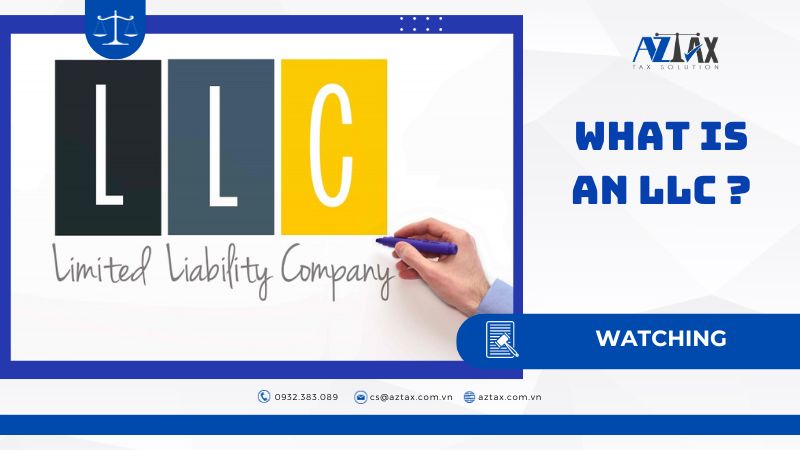
One distinctive feature of an LLC is its pass-through taxation, meaning the entity itself isn’t taxed. However, if the LLC has multiple owners, a tax return must be filed, and any income or loss is then passed through to the owners (referred to as members). These members are required to report income or loss on their personal tax returns and settle any applicable taxes.
2. How to apply for a LLC
While forming an LLC is generally simpler than establishing a corporation, it involves various administrative and compliance tasks.
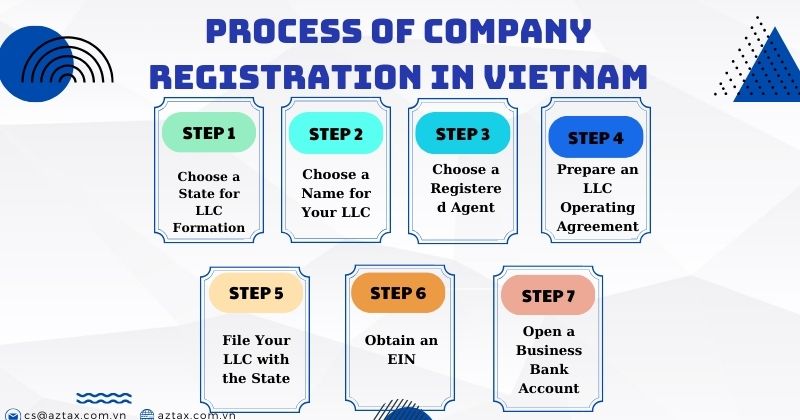
To guide you through the successful LLC application in accordance with state law, follow these eight steps:
Step 1: Choose a state to register LLC
Selecting a state for LLC formation is critical. While any state is an option, most owners prefer the state where they plan to conduct business. Factors such as cost, taxation, and LLC laws vary by state, influencing the decision. Forming an LLC in a state where it doesn’t conduct business may incur additional registration costs.
Step 2: Choose a name for your LLC
Choosing a unique name is crucial. Verify its availability by conducting an LLC name search on the state’s website to ensure it’s not registered with another entity. If not ready to file, consider reserving your name and performing a trademark search to avoid intellectual property issues.
Step 3: Choose a registered agent
An LLC must have a registered agent in its formation or qualifying state. The registered agent, also known as a service processing agent, receives legal notices and tax documents on behalf of the LLC. While owners can serve as agents, many opt for professional registered agent services for reliability and compliance.
Step 4: Prepare an LLC operating agreement
Although an LLC operating agreement is required in most states, having a written agreement is highly recommended. It outlines the operation of the LLC, even for a single-member entity. Well-drafted agreements are particularly crucial for multi-member LLCs, specifying ownership, profit distribution, and dispute resolution.
Step 5: File your LLC with the state
Officially establish your LLC by filing formation documents with the state’s Secretary of State or relevant department. These documents may be known as a Certificate of Organization, Certificate of Formation, or Articles of Organization. Although the term “incorporation” is commonly used, it’s more accurate to say that the LLC has been “formed” or “organized.”
Step 6: Obtain an EIN
After forming the LLC, apply for an Employer Identification Number (EIN) from the IRS. This unique identifier is used for bank accounts, tax filings, and official documents. Additionally, obtain state-specific tax identification numbers if the LLC operates in multiple states.
Step 7: Open a business bank account
While not a legal requirement, opening a separate business bank account is best practice. It helps separate business and personal finances, a crucial factor in preventing personal liability for the LLC’s debts. A business credit card can further assist in segregating transactions.
Step 8: Register to do business in other states (if necessary)
If the LLC operates in states beyond its formation state, it may need to register or foreign qualify in each state. This involves filing an application for authority and may require a Certificate of Good Standing. Compliance with state-specific criteria is crucial, and seeking legal advice is recommended to determine foreign qualification needs.
3. The 7 documents you need to create an LLC

Outlined below are the essential steps and documentation required to apply for LLC, a critical aspect that significantly influences your business’s success. Depending on the specifics of your business, certain steps may be omitted if you want to answer questions on how to get an LLC.
Internal Revenue Service (IRS) Form SS-4:
- Acquire an Employer Identification Number (EIN) by completing IRS Form SS-4.
- Obtain your EIN promptly by either filing the form through mail or applying for an LLC online.
- The EIN serves as a crucial identifier for tax forms and official documents.
Name Reservation Application:
- Choose a distinctive name for your LLC and verify its availability through a name search.
- Conduct a name availability search on the secretary of state or corporations bureau website.
- Ensure compliance with state-specific naming rules, considering prohibited and restricted words.
- File a name reservation form with the state (optional) to secure your chosen name during the LLC filing process.
Articles of Organization:
- Submit articles of organization, also known as a certificate of organization or formation, to the state.
- Download the appropriate form from the secretary of state website.
- Include the correct number of copies as required by the state.
- Articles of the organization typically include business name, purpose, duration, primary address, ownership details, management structure, and registered agent information.
Operating Agreement:
- Draft an operating agreement outlining rules for LLC operations, member rights and responsibilities, profit and loss distribution, and other crucial aspects.
- While not always mandatory during formation, an operating agreement is essential for governance.
- Includes business details, member information, management structure, and provisions for adding or removing members.
Initial and Annual Reports:
- File periodic reports to maintain accurate business records, confirming essential information about operations.
- Reports may go by names such as annual reports, statements of information, franchise tax reports, or business entity reports.
- Submission frequency varies, with some states requiring annual or biennial reports, while others collecting them less frequently.
Tax Registrations:
- Register your LLC with the department of revenue for applicable tax types, including business entity taxes, employer taxes, and sales and use taxes.
- Tax registration details and forms are often available on the state’s business portal.
Business Licenses:
- Based on the nature and location, obtain necessary licenses such as home occupancy permits, premises permits, regulated activity licenses, and professional licenses.
- Apply for licenses conveniently through the state corporate division’s online platform.
4. Advantages and Disadvantages of LLC
The Limited Liability Company (LLC) has a relatively recent business structure gaining popularity due to its hybrid nature, incorporating features from both corporations and partnerships.

An LLC provides owners with limited personal liability for business debts, similar to a corporation, while avoiding separate entity taxation, resembling a partnership. The advantages and disadvantages of the LLC are outlined below:
4.1 Advantages of Forming a Limited Liability Company
Limited Liability Company (LLC) is a versatile and advantageous business structure that has gained widespread popularity for its unique combination of features, offering numerous benefits to its owners. Here are the key advantages of forming an LLC:
- Limited Personal Liability: An LLC shields owners from personal liability for business debts, safeguarding personal assets, unlike sole proprietorships or partnerships.
- Flexible Management Structure: LLCs offer a versatile management structure, allowing management by owners (LLC members), a group of managers, or a combination of both. This flexibility surpasses the rigid structure of corporations requiring a board of directors.
- Easy Formation and Maintenance: The process of forming an LLC is relatively straightforward. Filing articles of organization with the secretary of state and paying a fee is typically all that’s required. Additionally, maintaining an LLC is less cumbersome compared to corporations, as there are fewer regulatory requirements.
- Pass-Through Taxation: LLCs enjoy pass-through taxation, meaning income is passed through to owners and taxed on their personal income tax returns. Moreover, the option to elect S corporation taxation provides potential tax savings.
4.2 Disadvantages of Forming a Limited Liability Company:
While the advantages typically outweigh the disadvantages for most businesses, considerations such as potentially higher taxes and limited flexibility should be carefully evaluated. Consulting with a qualified business attorney or law firm is essential to make an informed decision based on the specific circumstances of the business. Here are the key disadvantages of forming an LLC:
- Higher Taxes: One drawback of an LLC is the potential for higher taxes compared to sole proprietorships or partnerships. The IRS treats LLCs as pass-through entities, resulting in income being taxed as self-employment taxes on owners’ personal returns, rather than at the corporate level.
- Lack of Flexibility: An LLC may lack the flexibility seen in sole proprietorships or partnerships. The requirement for a written operating agreement outlining members’ rights and responsibilities can be considered inflexible for certain businesses.
- Limited Life: Unlike corporations that can exist indefinitely, LLCs have a limited life. Dissolution is required when a member departs or passes away, posing challenges for businesses intending to transfer ownership to the next generation.
5. Comparing LLCs with other entity types
When embarking on the journey of forming a business, one of the pivotal decisions revolves around selecting the most fitting business structure.
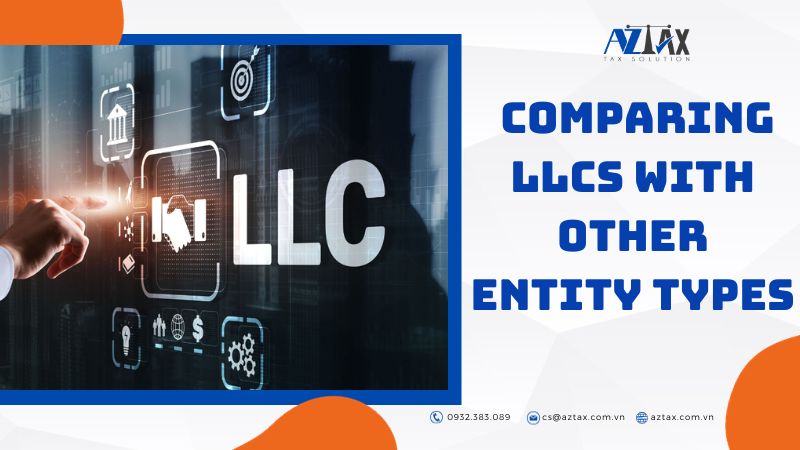
The landscape offers various business entity options, each presenting a distinct set of advantages and disadvantages. Below are comparisons between limited liability companies and other types:
- Comparing LLCs to C Corps, S Corps, and DBAs: It is crucial to delve into the unique benefits of Limited Liability Companies (LLCs), C Corporations, S Corporations, and DBAs (Doing Business As) before settling on the entity type that aligns with your business goals. Explore our comprehensive guide, “Comparing Company Types: Understanding C Corp, S Corp, LLC, and DBA Business Structures,” for an in-depth analysis.
- Weighing Pros and Cons: LLCs vs. S Corps: In the realm of pass-through taxation, both S corporations and LLCs stand out, yet distinctions arise in the flexibility of income allocation to owners. An LLC may offer versatility with several classes of membership interest, whereas an S corporation might be limited to a single class of stock. Delve deeper into the nuances by visiting our informative article on “LLCs versus S Corporations” to uncover additional differentiating factors.
- LLCs vs. Partnerships and Sole Proprietorships: For entrepreneurs contemplating the best fit for their venture, understanding the advantages and disadvantages related to taxation, asset protection, and other critical criteria is paramount. Whether comparing LLCs to sole proprietorships or partnerships, be they general or limited, our article “Sole Proprietorships, Partnerships, and LLCs are Commonly Used Entities” offers valuable insights into making an informed decision.
In the intricate process of business formation, selecting the right business structure is not a one-size-fits-all endeavor. Thorough exploration of the nuances between LLCs, C Corps, S Corps, DBAs, partnerships, and sole proprietorships is essential for steering your business towards success.
6. Types of LLCs and choose the right structure
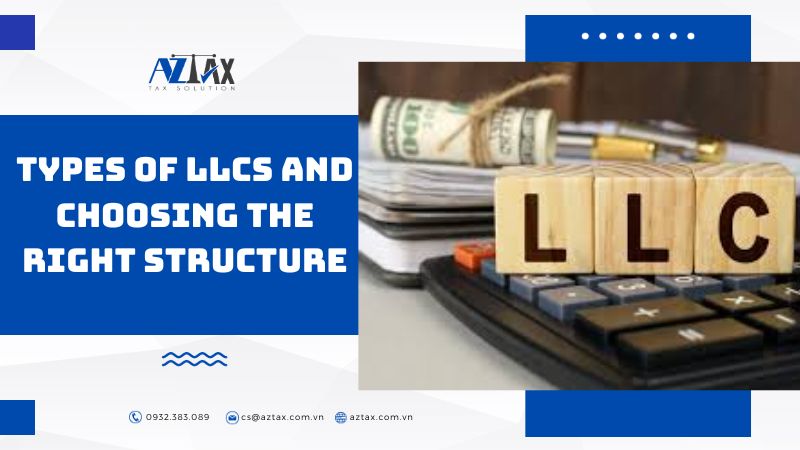
The prosperity of your business pivots to a meticulous selection of the most fitting LLC structures. Diverse types of LLC structures are at your disposal, each presenting a distinctive set of advantages and considerations, tailored to your business needs and objectives.
- Single-member LLCs: Tailored for individuals seeking to independently operate a single-member LLC.
- Multi-member LLCs: Ideal for businesses with multiple partners or investors, fostering collaborative ventures.
- Professional LLCs: Specifically designed for licensed professionals, such as doctors and lawyers, ensuring compliance with industry regulations.
- Series LLCs: Innovative structures allowing for multiple subdivisions within one entity, facilitating the separation of distinct ventures and properties.
- L3Cs: Blending the flexibility of an LLC with a social mission, L3Cs are designed for businesses with a primary goal of achieving social objectives alongside financial success.
Evaluate your industry, the number of members involved, and the desired level of liability protection when making the pivotal decision on the right LLC structure for your business. A thoughtful analysis aligned with your business objectives will serve as a compass guiding you towards the most suitable and effective structure for your entrepreneurial journey.
7. Long-Term Strategies for Maintaining Your LLC
To maintain your LLC’s robust standing, consistent upkeep is essential. Start by filing your annual report, a requirement in most states, ensuring it’s noted on your calendar.
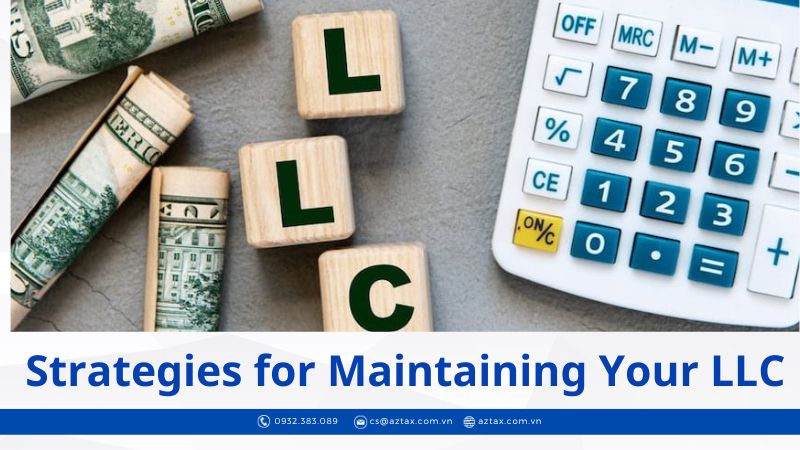
The report, submitted to the Secretary of State, verifies vital business details and can usually be completed online. Late filings may incur fees or even automatic dissolution, so stay proactive. Maintain meticulous records—although not legally mandated, fortifies your liability protection in legal matters and aids in tax obligations. Keep copies of essential documents for your business and in the cloud for easy access. Lastly, meet your tax responsibilities promptly, consulting a tax professional for guidance on potential deductions or credits available to your LLC.
8. Conclusion about how to make an LLC
The process of starting an LLC involves careful consideration and adherence to essential steps. From reviewing your business structure to filing necessary documentation and fulfilling legal requirements, each step plays a pivotal role in establishing a robust foundation for your venture. By successfully navigating through these stages, you not only gain coveted liability protection but also unlock the various benefits that come with the LLC structure.
As you embark on this journey, remember to consult with legal and financial professionals for personalized guidance tailored to your business needs. Stay proactive in maintaining compliance, updating documents, and adapting to changes. The journey of starting an LLC is not just about the formation, it’s about setting the stage for a resilient and successful business future.
Hopefully with the above content you can answer the question “how to apply for a LLC?” as well as establishing your own limited liability company to get the desired start in the business process. If you still have questions about how to create an LLC, you can contact AZTAX using the information below for the best support. Good luck on your entrepreneurial endeavors!
9.FAQ
LLC filing fees range from $35 to $500. As of 2024, the average cost to form an LLC in the US is $132.
An LLC is typically treated as a pass-through entity for federal income tax purposes. This means that the LLC itself doesn’t pay taxes on business income. Members of the LLC pay taxes on their share of the LLC’s profits. State and local governments might levy additional LLC taxes.
Online Application:
- Access the online EIN application on the official IRS website using a web browser.
- Applying online is the fastest method, and you’ll receive your EIN immediately.
- Be aware that you have a 15-minute window to complete the online application.
Other Methods:
- If applying by mail, print the application and send it, which may take up to four weeks.
- If applying by fax, the EIN is typically issued within four business days.
Step 1: Conduct a Comprehensive Evaluation of Your Operating Agreement
Step 2: Define Terms and Profit-Sharing Structures
Step 3: Facilitate a Formal Voting Process
Step 4: Revise Your Articles of Organization
Step 5: Review, Revise, and Submit Updated Tax Forms
Step 1: Determine Transfer Scope: Choose Between Partial or Full LLC Ownership Transfer.
Step 2: Scrutinize Legal Documents: Examine Operating Agreements and Articles of Organization.
Step 3: Negotiate Terms: Engage in Discussions with Prospective Buyers.
Step 4: Formalize the Agreement: Draft a Buy-Sell Agreement with the New Buyer.
Step 5: Document the Change: Officially Record the Transfer of Ownership.
Step 6: Revised Documents: Update and Amend Necessary Legal Papers.
Step 7: Communication: Notify Pertinent Parties about the Ownership Change.
Update your business information with the IRS effortlessly by submitting Form 8822-B. This form serves to inform the IRS about changes to your business mailing address, location, or responsible party. Accessible online, Form 8822-B offers a straightforward process for making these updates.
Wrap up the dissolution of your LLC at the state level by initiating a dissolution vote, settling outstanding taxes, and filing conclusive tax returns. After these steps, submit your articles of dissolution to the secretary of state, and upon approval, your dissolution process is officially concluded.
An LLC, short for a limited liability company, offers a distinctive advantage: its members enjoy protection from personal liability for the company’s debts. This means that the financial responsibilities of the LLC do not extend to the personal assets of its members. Additionally, LLCs follow a “pass-through” taxation model, where all profits and losses flow through to the members’ individual tax returns, providing a straightforward and flexible approach to taxation.
An LLC license serves as confirmation that you have successfully established a limited liability company (LLC). An LLC is a business structure that provides personal and financial liability protections for all owners and members. Unlike corporations, an LLC does not pay federal taxes; instead, profits are reflected on members’ personal tax returns as income.
Formation of an LLC must comply with state laws, and individual members are required to submit documentation to the state government for approval and operation, commonly known as obtaining an LLC license.











